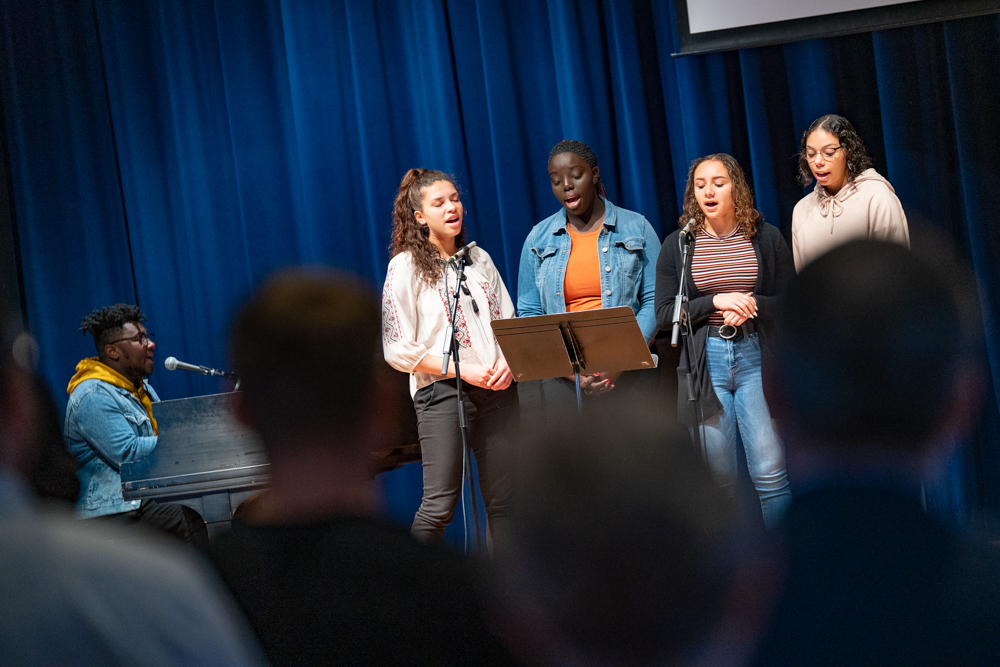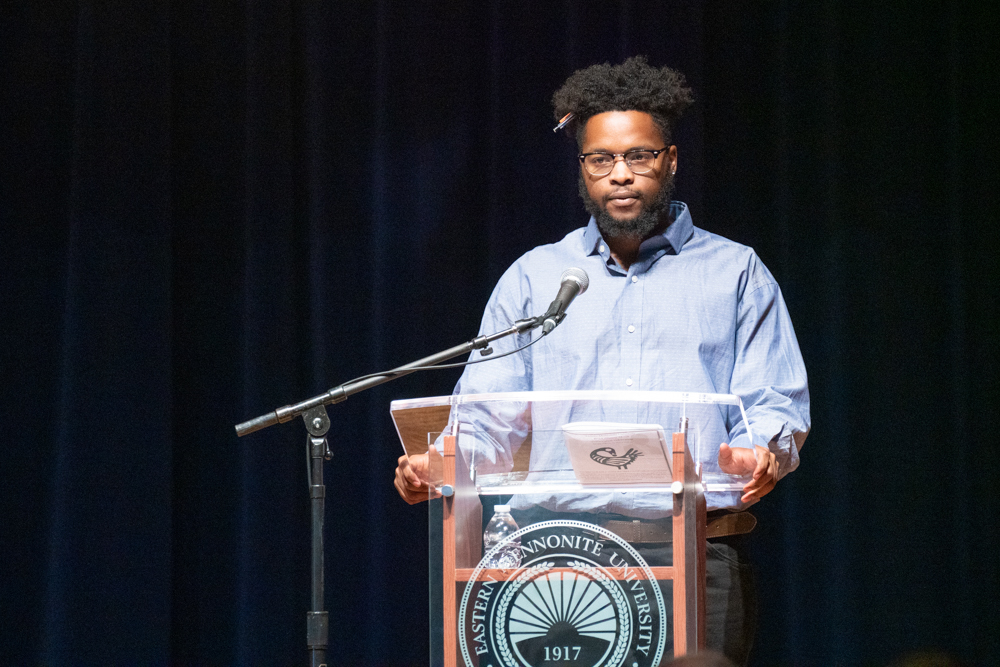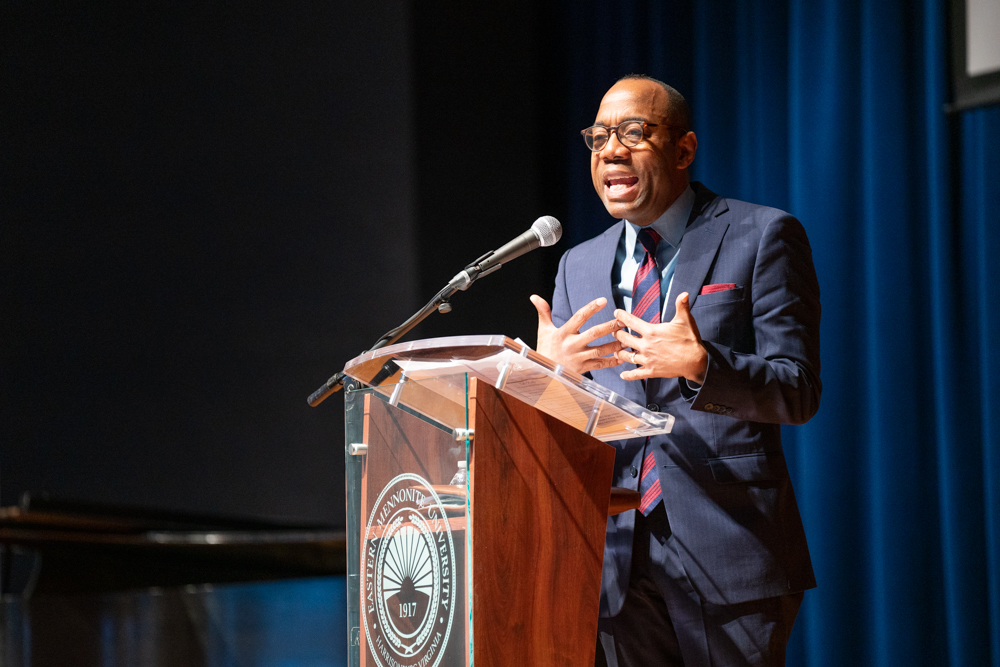It took a few years of persistence and many phone calls on the part of Eastern Mennonite University’s Director of Multicultural Services Celeste Thomas to bring The Rev. Dr. Cornell William Brooks to campus. The former president and CEO of the NAACP from from 2014-17, he has been a visiting professor at Harvard Divinity School for the last two years and serves this academic year as professor of the practice of public leadership and social justice, and director of The William Monroe Trotter Collaborative for Social Justice at Harvard Kennedy School’s Center for Public Leadership.
And it was relationship that eventually made all the difference. Brooks, a fourth-generation ordained minister of the African Methodist Episcopal church, has preached locally several times.

“I had met Sister Celeste years ago on one of my visits to Bethel AME here in Harrisonburg and once you meet someone, it’s hard to say no,” he said to Bethel parishioners, including senior pastor The Rev. Dr. Chinita Richardson, and EMU campus community members at a Sunday worship service in Mainstage Theater.
“It was quite a blessing to have the former CEO and president of the National NAACP, reverend and civil rights attorney here on campus,” Thomas said. “He is the epitome of what it looks like to live into Micah. So, if you are asking what can I do to promote a social justice way of life, he talks the talk and walks the walk. He is genuine in word and deed.”
Brooks spoke twice during his visit to commemorate Black History Month on the theme of Sankofa, a Ghanese metaphor about “reaching back to knowledge gained in the past and bringing it into the present to make positive progress.”
“In his Sunday message, he emphasized that we can’t do social justice well without letting our God lead us,” said Maya Dula, co-president of EMU’s Black Student Alliance. “He reiterated over and over that without prayer, work for racial justice would not be where it is today. We won’t get where we want to get without God at the forefront, and I think he may be right.”
Brooks took his Sunday text from 2 Kings 4 of the widow and the miraculous supply of oil. “What do you do when you’re doing without?” he asked. “I lift up three lessons for spiritual contemplation. Take your problem to the Lord. Take stock, assess what you have. Take to your closet.”
In Brooks’ sermon, the Biblical story reflects the depth and richness of God’s presence in Black history, then and now, and becomes a spiritual guide to lift listeners who are “morally depressed, empty of hope, aspiration, love, faith for the future.”
In response to the prophet’s question, the widow says at first she has nothing.
“Then She considers what she has. Because she says in answer to the prophet’s question, nothing except a little oil. What’s our little oil? Our little oil looks like a little history, a little history. A little oil called Rosa Parks, MLK…Richard Allen, AME, our history of resistance.”
Black History Month “brings us to the Intersection of history and hope,” he said. “All of our history bears witness to God’s movement among us.”

Monday’s convocation included readings by members of the Black Student Alliance and music by the Gospel Choir. Brooks’ theme was “History and Hope on the Slave (Auction) Block.”
The history of Black people in this land, beginning with 16 Africans in 1619 and continuing through the horrors of oppression and suppression, is “the kind of history that calls into our morality, our sense of civichood as a nation,” he said. “It calls into question the consistency of the Constitution and the hypocracy of those who say they believe in the Bible … What do we do with this history?”
Yet this history, whether read in books or heard in stories from relatives or even activism and narratives shared on Instagram, Facebook and Twitter, is “testimony … Black history, surviving and thriving in spite of what they came up against. Those are stories you cherish … Black history is about this moment. It is not only about what is being recorded but about what is made and done.”
Through it all is God’s work, he said, and it is the story of all of us.
“…if you believe in God, if you believe in Jesus, if you believe God the Father, if you believe in the Holy Spirit, if you believe in Matthew, Mark, Luke and John, then you gotta believe in the history of black people. You’ve got to believe in God’s power and presence and movement in the history of Black people and if you believe in that, you’ve got to claim it, you got to read it, you have to love it.”
Brooks’ visit was sponsored by EMU’s Multicultural Student Services, the Black Student Alliance, the Committee on Diversity and Inclusion, and the Bible, Religion and Theology Department.
Several other events, including the BSA’s annual Town Hall on Race, also commemorated the month.
